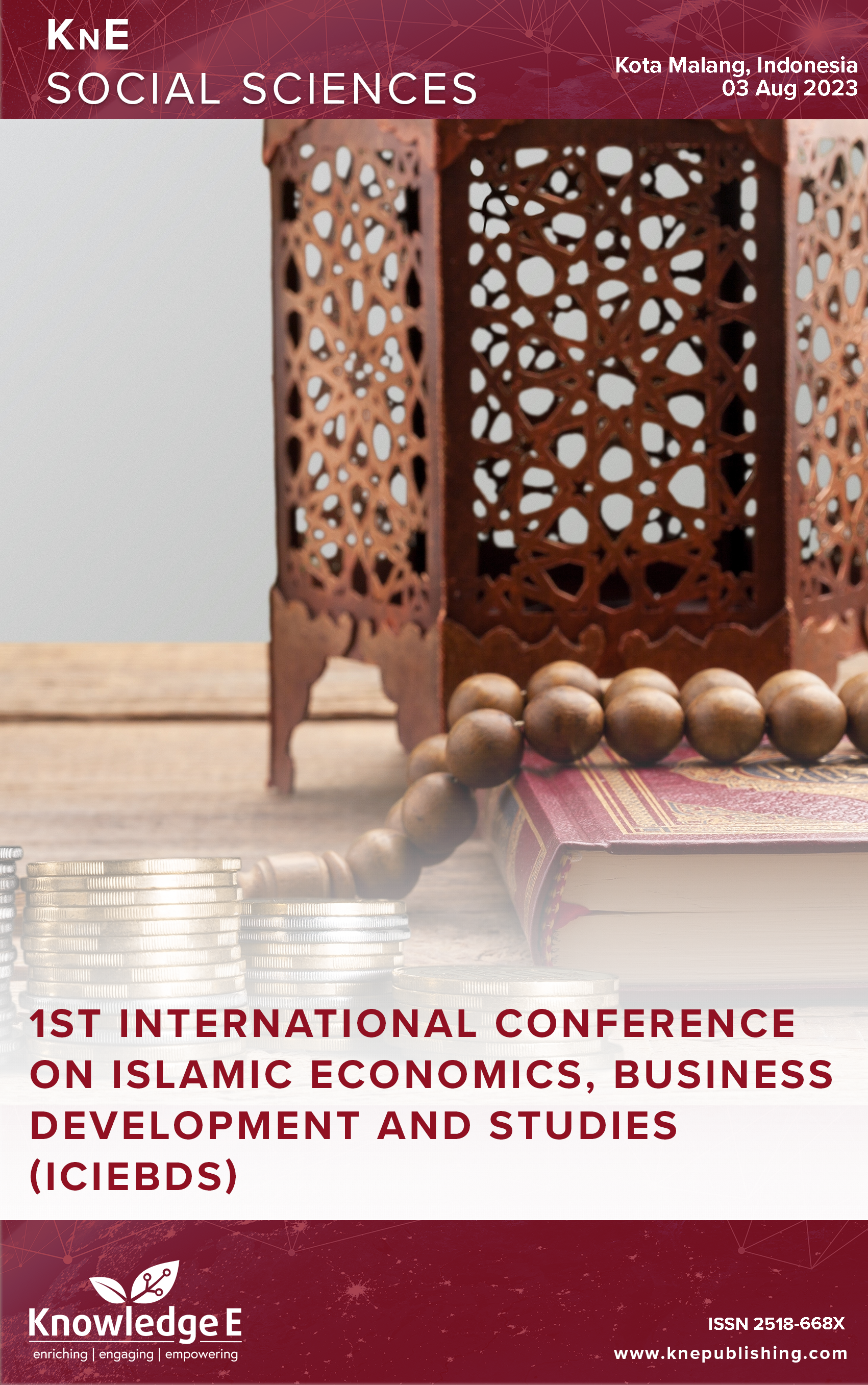The Influence of Family Environmental and Entrepreneurship Education on Interest in Entrepreneurship with Self Efficacy as a Mediation Variable in Sharia Business Perspective (Study on Students of the Faculty of Economics and Islamic Business UIN Raden In
DOI:
https://doi.org/10.18502/kss.v9i16.16228Abstract
The research investigates the influence of family environment and entrepreneurship education on interest in entrepreneurship with self-efficacy as a mediating variable from a Sharia business perspective. This research uses a quantitative approach with a sample size of 129 respondents. The research results show that all independent variables have a significant effect on interest in entrepreneurship. The self-efficacy variable can mediate the influence of business capital on interest in entrepreneurship among FEBI UIN Raden Intan Lampung students and entrepreneurship education on interest in entrepreneurship among FEBI UIN Raden Intan Lampung students. It can be concluded that the application of business capital, entrepreneurship education, Self-efficacy, and interest in entrepreneurship from a Sharia business perspective is very good.
Keywords: Business Capital, Entrepreneurship Education, Self-Efficacy, Interest in Entrepreneurship.
References
Shoimah S, Ekonomi F. Pengaruh Self Efficacy. Lingkungan Keluarga Dan. 2019;2(2):189–203. DOI: https://doi.org/10.52166/j-macc.v2i2.1663
Suhartini Y. Analisis faktor-faktor yang mempengaruhi minat mahasiswa dalam berwiraswasta (studi pada mahasiswa Universitas PGRI Yogyakarta). J. Akmenika UPY. 2011;7(1):24.
Rahayu ES, Laela S. Pengaruh minat berwirausaha dan penggunaan sosial media terhadap kewirausahaan mahasiswa. J. Pengemb. Wiraswasta. 2018;20(3):203–16. DOI: https://doi.org/10.33370/jpw.v20i3.246
Sirait E, Setyoningrum AA. Pengaruh Modal Usaha dan Pendidikan Kewirausahaan Terhadap Motivasi Berwirausaha Mahasiswa Kemaritiman di Masa Pendemi Covid- 19. J. Ekon. Sos. Hum. 2022;3(05):87–98. DOI: https://doi.org/10.54371/jiip.v5i8.796
Wardani NT, Dewi RM. “Pengaruh Motivasi, Kreativitas, Inovasi dan Modal Usaha terhadap Minat Berwirausaha,” J. Manaj. dan Kewirausahaan, vol. 9, no. 1, p. 93, 2021, https://doi.org/10.26905/jmdk.v9i1.5806. DOI: https://doi.org/10.26905/jmdk.v9i1.5806
E. Mulyani, “Model pendidikan kewirausahaan di pendidikan dasar dan menengah,” J. Ekon. dan Pendidik., vol. 8, no. 1, 2011. DOI: https://doi.org/10.21831/jep.v8i1.705
P. P. Adhitama and F. ARIANTI, “Faktor-faktor yang mempengaruhi minat berwirausaha (Studi kasus mahasiswa Fakultas Ekonomika dan Bisnis UNDIP, Semarang).” Fakultas Ekonomika dan Bisnis, 2014.
Farida S, Nurkhin A. Pengaruh pendidikan kewirausahaan, lingkungan keluarga, dan self efficacy terhadap minat berwirausaha siswa SMK program keahlian Akuntansi. Econ. Educ. Anal. J. 2016;5(1).
Seni NN, Ratnadi NM. “Theory of planned behavior untuk memprediksi niat berinvestasi,” E-Jurnal Ekon. Dan Bisnis Univ. Udayana. 2017;12(6):4043–68. DOI: https://doi.org/10.24843/EEB.2017.v06.i12.p01
P. G. P. Sari, M. Fadhilah, and B. D. S. Maharani, “Membangun Minat Berwirausaha Melalui Motivasi, Pendidikan Kewirausahaan Dan Kepribadian,” Magisma J. Ilm. Ekon. dan Bisnis, vol. 9, no. 2, pp. 125–134, 2021. DOI: https://doi.org/10.35829/magisma.v9i2.162
Deshpande SS, Cheryan M, Salunkhe DK, Luh BS. Tannin analysis of food products. Crit Rev Food Sci Nutr. 1986;24(4):401–49. DOI: https://doi.org/10.1080/10408398609527441
Uda SK, Basrowi B. Environmental education using SARITHA-Apps to enhance environmentally friendly supply chain efficiency and foster environmental knowledge towards sustainability. Uncertain Supply Chain Manag. 2024;12(1):359–72. DOI: https://doi.org/10.5267/j.uscm.2023.9.015
Kuratko DF. The emergence of entrepreneurship education: Development, trends, and challenges. Entrep Theory Pract. 2005;29(5):577–97. DOI: https://doi.org/10.1111/j.1540-6520.2005.00099.x
Basrowi, Kewirausahaan Untuk Perguruan Tinggi. Bogor: Ghalia Indonesia; 2011.
Sugiyono, “Metode penelitian pendidikan pendekatan kuantitatif, kualitatif dan R&D,” 2013.

